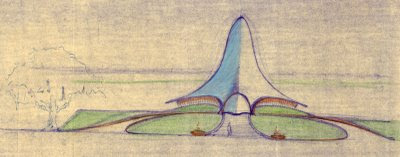 Philip H. Roach, Jr., Sketch, n.d.
Philip H. Roach, Jr., Sketch, n.d.Folder 28, Philip H. Roach, Jr. Collection, The Southeastern Architectural Archive,
Special Collections Division, Tulane University Libraries
Historic science fiction and fantasy literature frequently elucidates cultural truths in ways that evidential primary documents fail. Utopian and dystopian notions of urban design and renewal may have actually had their first manifestations in dime novels and pulp literature. Intended for the masses, these cultural forms are frequently (and alarmingly!) insightful, in sync with subconscious notions of who we are as human beings, and where we desire and fear to go. For researchers, this literature (and secondary sources) is notoriously difficult to mine for information, since analytical indexing for science fiction is often tied to limited-edition print bibliographies, known by a small coterie of researchers, but not the general public.
This is why Hal's database is so wonderful!
To search the SFFRD (and you can do so by subject) click here. To give an example, enter the search term "architecture" and see what results. Enter "building." Enter "landscape." Enter "cities."
My own to read list based on these searches:
Green, Ernest. "The Social Function of Utopian Architecture," Utopian Studies 4:1 (1993): 1-13.
Hatch, Richard. "The Ideology of Work and the Architecture of Utopia," in Saccaro Del Buffa, Giuseppa and Lewis, Arthur O., eds. Utopia e Modernita: Teorie e prassi utopiche nell'eta moderna e postmoderna. Rome: Gangemi Editore, 1989. pp.175-186.
Missal, Alexander. "In Perfect Operation: Social Vision and the Building of the Panama Canal," in Verheul, Jaap, ed. Dreams of Paradise, Visions of Apocalypse : Utopia and Dystopia in American Culture. Amsterdam: VU University Press, 2004. pp. 69-77.
Now, the database does not have full-text capabilities, but a simple search for the journal or book title in your library's OPAC (online catalog) will allow you to find the publication or give you the information necessary to submit an interlibrary loan request.
If you wish to join the interdisciplinary Society for Utopian Studies, which includes subscription to Utopian Studies Journal, click here.
No comments:
Post a Comment